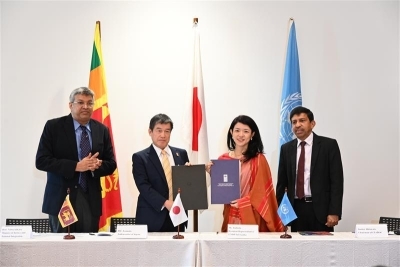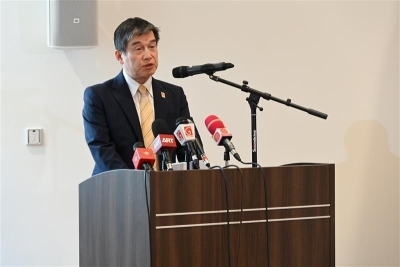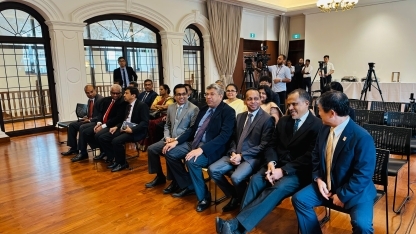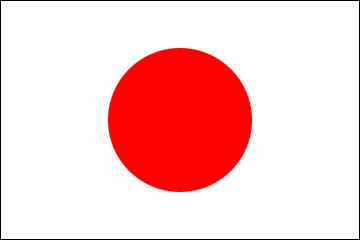Sri Lanka Receives 2.5 million USD from the Government of Japan to Strengthen Anti-Corruption Mechanisms
2025/7/1

1 July 2025, Colombo, Sri Lanka: Corruption undermines sustainable development, the well-being of its citizens, their trust in institutions and tax morale. The cost of corruption is felt by all segments of society and the economy. Corruption significantly deters foreign investments, as it creates an unpredictable and risky business environment. Investors often perceive high levels of corruption as indicative of weak governance and regulatory frameworks, leading to concerns about the protection of their investments and the potential for unfair competition.
H. E. Akio ISOMATA, Ambassador of Japan to Sri Lanka and Ms. Azusa Kubota, Resident Representative, United Nations Development Programme (UNDP) in Sri Lanka, in the presence of the Minister of Justice, Hon. Harshana Nanayakkara, marked the launch of the new project titled ‘The Project for Promoting Prosecution of Corrupt Practices through the Establishment of Anti-corruption Mechanism’ through a signing ceremony held today. High-level attendees present to mark the occasion included; Hon. Parinda Ranasinghe, Attorney General; Mr. K.B.Rajapakse and Mr. Chethiya Goonesekera P.C, Commissioners of Commission to Investigate Allegations of Bribery and Corruption (CIABOC); Dr. Nandika Kumanayake, Secretary to the President, along with representatives from participating agencies.

‘The Project for Promoting Prosecution of Corrupt Practices through the Establishment of Anti-corruption Mechanism’ is a 3-year project funded by the Government of Japan and implemented by the UNDP in Sri Lanka. This 2.5 million USD project aims to promote transparency, accountability, and integrity in governance and business practices through effective and institutionalised preventive mechanisms in the public and investment promotion sectors; strengthen institutions to enhance corruption related investigative processes, improve coordination with stakeholders, and ensure quality of prosecutions; and empower citizens to effectively mobilize against corruption and enhance social accountability. The project also seeks to engage and empower youth, children and journalists to actively contribute to the fight against corruption and promote a culture of integrity.
Highlighting Japan’s commitment to support the people of Sri Lanka, H. E. Akio ISOMATA, Ambassador of Japan to Sri Lanka noted, ” Eradication of corruption and good governance are a prerequisite for competitive and sustainable economy. They are an essential part of very basic infrastructure of any business society. It is imperative to regain confidence of foreign investors in the sound business environment in Sri Lanka. Japan is paying a close attention to changes happening in Sri Lanka's social landscape with high regard for the new government's efforts, and with high expectations. We would also like to see mid-term and long-term economic development strategy, including articulate sector-wise industrial promotion policies, under the new government, so that we can better understand what opportunities are available for making fresh investments in Sri Lanka. Japan continues to be closely together with Sri Lanka for all these future endeavors.”

Corruption undermines trust in public institutions and deters investors, leading to reduced foreign investment and stunted economic growth. It diverts resources from essential services, increasing poverty, weakening the Rule of Law, and threatening public health with inadequate medical care and sanitation. This can cause social instability, fuel unrest, and lead to violence. Ultimately, corruption threatens the safety, well-being, and sustainable development of communities.
Commenting on the role of UNDP, Ms. Azusa Kubota, Resident Representative for UNDP in Sri Lanka highlighted, “As Sri Lanka takes decisive steps to address corruption, this partnership with CIABOC facilitated by generous funding from the Government and people of Japan marks a pivotal moment in our collective journey towards good governance. The launch of this project is not just about strengthening institutions—it is about restoring public trust, empowering citizens, and creating a level playing field for all. Through the implementation of the National Anti-Corruption Action Plan 2025–2029, we aim to support a whole-of-society approach that dismantles systemic barriers for sustainable development and fosters a culture of transparency and accountability. UNDP remains committed to working alongside national partners to ensure that anti-corruption efforts are not only sustained but transformative.”
The overall objective of this Project is to ensure the effective implementation of the activities proposed in the National Anti-Corruption Action Plan 2025-2029 (NACAP), which will contribute to a more transparent, accountable, and resilient society, ultimately leading to a significant reduction in corruption and an enhancement of public trust in institutions. The project seeks to support a whole-of-society approach adopted in the NACAP to respond to corruption engendered barriers which hinder progress and development. Through targeted interventions, the project seeks to support the dismantling of these barriers, facilitating positive change and empowering communities to thrive.
